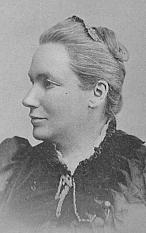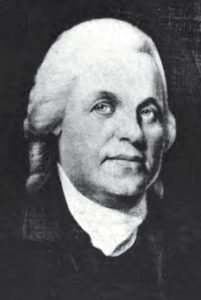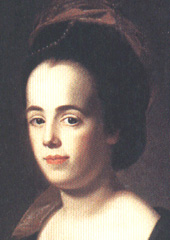Atwood, Isaac Morgan
Isaac Morgan Atwood (March 24, 1838-October 26, 1917) was a Universalist minister, journalist, educator, and denominational leader. During the four decades spanning the end of
Isaac Morgan Atwood (March 24, 1838-October 26, 1917) was a Universalist minister, journalist, educator, and denominational leader. During the four decades spanning the end of
John Murray Atwood (September 25, 1869-November 4, 1951), a Universalist minister, educator, and denominational leader, served, for 37 years, as dean of the Canton Theological
John Mather Austin (September 26, 1805-December 20, 1880) was a preeminent Universalist clergyman, editor, author and social activist in New York State, whose most prolific
William Stevens Balch (April 13, 1806-December 25, 1887), a celebrated Universalist preacher, was also an evangelist, a denominational organizer, journalist, politician, teacher, and historian. Proud
The Ballou family of New England produced some of the most well-known and distinguished American Universalists, including Hosea Ballou, the leading theologian and evangelist of
Adin Ballou (April 23, 1803-August 5, 1890), founder of the utopian community at Hopedale, Massachusetts and a leading 19th century exponent of pacifism, was during
Hosea Ballou (April 30, 1771-June 7, 1852) was the most influential of the preachers in the second generation of the Universalist movement. His book, A
Hosea Ballou 2d (October 18, 1796-May 27, 1861), Universalist minister, scholar, educator, and journalist, was the grandnephew of the theologian and denominational leader Hosea Ballou.
Phineas Taylor Barnum (July 5, 1810-April 7, 1891), known as P. T. Barnum, a prominent Universalist, the most influential American showman of the nineteenth century,
Clara Barton (December 25, 1821-April 12, 1912) was both famous and honored in her lifetime—and has a well-earned place in American history—as the angel of
Mary Charlotte Ward Granniss Webster Billings (July 11, 1824-March 2, 1904) was a Universalist author, activist, and hymn writer. The wife of two Universalist ministers,
Herman Bisbee (October 29, 1833-July 6, 1879) is best known as the only American Universalist minister to have been found guilty of heresy. After losing
Georgene Esther Bowen (February 13, 1898-September 1984) was a Universalist missionary and social worker. She worked at the Blackmer Home for underprivileged girls in Japan
John Boyden (May 14, 1809-September 28, 1869), a Universalist minister, politician, and social reformer, was a disciple of Hosea Balou and the longtime pastor of
Bruce Wallace Brotherston (August 12, 1877-April 17, 1947) was a Universalist minister, author, and educator. After 16 years in the ministry he went on to
Olympia Brown (January 5, 1835-October 23, 1926) dedicated her life to opening doors for women. Among only a handful of women to graduate from college,
Orestes Augustus Brownson (Sept. 16, 1803-April 17, 1876) as a maverick Universalist and Unitarian minister, then an independently-minded journalist, essayist, and critic, was a wide-ranging
Alice Cary (April 26, 1820-February 12, 1871) and Phoebe Cary (September 4, 1824-July 31, 1871) were in their day well known and loved for their
Ernest Cassara (June 5, 1925-April 10, 2015) was a Unitarian and a Universalist minister, a scholar of American Universalism, and a professor of history. He
Seth Chandler (December 2, 1806-October 4, 1889) was a Universalist minister, one of the leaders of the Restorationist Controversy within the denomination, minister of the First Parish

Augusta Jane Chapin (July 16, 1836-June 30, 1905), Universalist minister and educator, was one of the earliest women to be ordained in ministry. She was
Edwin Hubbell Chapin (December 29, 1814-December 26, 1880), Universalist minister, author, lecturer, and social reformer, was one of the most popular speakers in America from
Alfred Storer Cole (October 9, 1893-January 5, 1977) was a minister, scholar, writer, librarian of the Universalist Historical Society and, for a quarter century, teacher
Orello Cone (November 16, 1835-June 23, 1905), a Universalist minister and scholar, was a professor at the Theological School of St. Lawrence University and president
Maria Cook (1779-December 21, 1835) was the first Universalist woman preacher in America. A traveling evangelist during the early 1810s, she preached before many audiences
Henry Noble Couden (November 21, 1842 – August 22, 1922) was Chaplain of the United States House of Representatives for twenty-five years (1895-1921). After being
John Albert Cousens (November 17, 1874-July 2, 1937), a Universalist businessman and educator, was for eighteen years the president of Tufts College. John was born
Florence Ellen Kollock Crooker (Jan. 18, 1848 to April 21, 1925) was a Universalist minister and advocate of temperance and women’s suffrage. A capable organizer
The Universalist society in Oxford, Massachusetts, one of the earliest Universalist churches in America, hosted the conventions which led to the creation of the Universalist
George de Benneville (July 26, 1703-March 19, 1793), a physician, was a universalist evangelist in Europe and an early advocate of the doctrine of universal
Paul Dean (March 28, 1783-October 1, 1860) was a prominent Universalist evangelist and minister in the early 19th century, a rival of Hosea Ballou, a leader
Richard Eddy (June 21, 1828-August 16, 1906), a Universalist minister, wrote an enduringly valuable two-volume history, Universalism in America, 1884-86. Born and raised in Providence, Rhode
Roger Frederick Etz (April 30, 1886-December 19, 1950) was a parish minister and a major figure in the Universalist denomination for forty years. He was
William Farwell (January 6, 1749-December 11, 1823), one of the founding generation of American Universalist evangelists, organized societies in the neighborhood of Charlestown, New Hampshire
Jesse Babcock Ferguson (January 19, 1819-September 3, 1870), a renowned orator and minister in the Antebellum South, converted to universalist and unitarian beliefs. His conversion
Ebenezer Fisher (February 6, 1815-February 21, 1879), Universalist minister and educator, was the first president of the Theological School at St. Lawrence University in Canton,
Victor Alonzo Friend (July 21, 1870-January 2, 1952), a well-known Boston-area businessman whose company produced Friend’s Brick Oven Baked Beans, was a prominent Universalist lay
Frances Dana Barker Gage (October 12, 1808-November 10, 1884), a lecturer, political activist, journalist, and novelist, was an outspoken advocate of women’s rights, temperance, and
Lucia Fidelia Woolley Gillette (April 8, 1827-October 14, 1905) was one of the first women to be ordained to the Universalist ministry in the United
Horace Greeley (February 3, 1811-November 29, 1872), Universalist journalist, reformer, and politician, is best known as the longtime, innovative publisher and editor of the New
Frank Oliver Hall (March 19, 1860-October 18, 1941) was an inspiring preacher and social gospeler who founded the Universalist Commission on Social Service. He served
Clarence J. Harris (March 16, 1873-November 27, 1941) was a minister who served both Universalist and Unitarian congregations. During the early years of the motion
Alice Mildred Harrison (July 27, 1906-June 13, 1989), a religious educator, was a pioneering leader and organizer of youth programming and activities for the Universalist
John Holmes (January 6, 1904-June 22, 1962), a poet and critic, was a teacher of literature and modern poetry at Tufts University for 28 years.
The Humiliati, composed mostly of young Universalist ministers recently graduated from the School of Religion of Tufts College in Medford, Massachusetts, was organized in 1945
Lydia Ann Moulton Jenkins (1824 or 1825-May 7, 1874) was a leader in the women’s rights movement, a Universalist minister, and later a homeopathic physician.
Joseph Jordan (1842-1901), the first African American to be ordained as a minister by the Universalist denomination, founded the First Universalist Church of Norfolk, Virginia
Max Adolph Kapp (February 1, 1904-January 1979), was a minister, theological school professor and dean, and a denominational official. He played a significant role in
Thomas Starr King (December 17, 1824-March 4, 1864), a Universalist and a Unitarian minister, was a lecturer and orator whose role in preserving California within
Born in Gardner, Massachusetts, Abner was the sixth of ten children of Timothy and Moriah Stone Kneeland. His formal education stopped after a year in
In 1969 the Universalist Historical Society (UHS) engaged Russell E. Miller, University Archivist and Dickson Professor of English and American History at Tufts University, a
Mary Ashton Rice Livermore (December 19, 1820-May 23, 1905) was a key organizer for the United States Sanitary Commission during the Civil War. Afterwards, she
Samuel Chapman Loveland (August 25, 1787-April 8, 1858) was a Universalist minister, scholar, educator and pioneer religious journalist. Many of the ministers he trained went
Angus Hector MacLean (May 9, 1892-November 11, 1969), Universalist minister, theological school professor and dean, played a major part in reshaping the philosophy and practice
Lee Sullivan McCollester (June 5, 1859-December 26, 1943) was a Universalist minister, Professor of Religious Literature and Chaplain at Tufts College (now University), and the

John Murray (December 10, 1741-September 3, 1815), a preacher from the British Isles, became the most widely-known and respected voice of American Universalism during the

Judith Sargent Murray (May 5, 1751-June 9, 1820), essayist, poet, and playwright, was the most prominent woman essayist of her day. She argued forcefully for
Lucius Robinson Paige (March 8, 1802-1896) was a Universalist minister, biblical scholar, historian, and public official. Lucius was the youngest of nine children born to
Kenneth Leo Patton (August 25, 1911-December 25, 1994), identifed as one of the major poets and a prophet of contemporary liberal religion, was a voice
William Arthur Peacock (August 23, 1905-September 15, 1968) was a British Universalist and Unitarian minister, Labour Party politician, and a journalist in religion and politics.
Leslie Talbot Pennington (October 30, 1899-December 6, 1974), a Unitarian and Universalist minister who chaired the Unitarian Commission on Church Union, was throughout his career
David Pickering (May 28, 1788-January 6, 1859), a Universalist minister, founded the Providence Association, an organization which challenged the disciplinary authority of the New England
George Mortimer Pullman (March 3, 1831-October 19, 1897), best known for the palatial railroad sleeping and dining cars that bore his name, was a lifelong
John Moses Ratcliff (June 6, 1892-February 22, 1953), a Universalist minister, was Professor of Education and Religious Education at Tufts College, Dean of Tufts School
Ellsworth C. Reamon (July 6, 1895-November 9, 1983), an active Universalist and Unitarian Universalist parish minister for 55 years, held a number of important denominational
Caleb Rich (August 12, 1750-October 18, 1821), one of the earliest New England Universalist preachers, was the first to proclaim that there would be no
Benjamin Rush (December 24, 1745-April 19, 1813), a signer of the Declaration of Independence, was the most celebrated American physician and the leading social reformer
Thomas Jefferson Sawyer (January 9, 1804-July 24, 1899), Universalist minister and educator, is best known for successfully promoting the establishment of Universalist colleges and seminaries.
Clinton Lee Scott (September 28, 1887-September 28, 1985), a Universalist minister, played a major role in the revitalization of the Universalist denomination during the 1930s,
Carl Gerrard Seaburg (October 21, 1922-December 16, 1998) was a minister, scholar, writer, editor and long-time member of the staff of the Unitarian Universalist Association.
Quillen Hamilton Shinn (January 1, 1845-September 6, 1907), Universalist minister and well-traveled missionary, is known as the “St. Paul of the Universalist Church.” He has
James Shrigley (April 5, 1813-July 24, 1905) was a Universalist minister, a United States Army chaplain during the Civil War, a leader in the Pennsylvania
Clarence R. Skinner (March 23, 1881-August 26, 1949), minister, teacher, writer and social activist, is widely regarded as the most influential Universalist of the first
Dolphus Skinner (May 18, 1800-October 2, 1869), a Universalist minister and editor, served the Universalist church in Utica, New York for over 40 years. His
Stephen Rensselaer Smith (September 27, 1788-February 17, 1850) was a Universalist evangelist in the state of New York at a time when Universalism was rapidly
Caroline Augusta White Soule (September 3, 1824-December 6, 1903), a novelist, poet, religious writer, editor, and minister, was one of the founders and the first
Charles Spear (May 1, 1803-April 13, 1863) took up the idea of abolishing the death penalty at a time when the idea was widely regarded
John Murray Spear (September 16, 1804-October 5, 1887), made his career as a Universalist minister, abolitionist, activist against the death penalty, and advocate for women’s
Nathaniel Stacy (December 2, 1778-April 7, 1868), was a pioneer Universalist preacher in central New York State and western Pennsylvania. His fortitude was legendary. For
Adams Streeter (December 31, 1735-September 2, 1786) was the first minister of the Universalist congregations in Oxford and Milford, Massachusetts, societies at the heart of
Abel Charles Thomas (July 11, 1807-September 27, 1880) was a Universalist evangelist, minister, journalist, and historian. Although he served the Universalist church in Philadelphia in
Edward Turner (July 28, 1776-January 24, 1853) ranked second only to Hosea Ballou among Universalist ministers of his generation. He was a denominational organizer, a
John van Schaick, Jr. (November 18, 1873-May 16, 1949), Universalist parish and Social Gospel minister, was active in war relief in Europe during World War
Charles Nelson Vickery (February 10, 1920-March 26, 1972) was a Universalist and Unitarian Universalist minister, a social worker in the United States and post-World War
William Vidler (May 4, 1758-August 23, 1816), a British Universalist and Unitarian preacher and publisher, was a disciple and colleague of Elhanan Winchester. Together with Unitarian
Rufus Austin White (Nov. 24, 1857 to July 25, 1937) was a Chicago minister active in charity, child welfare, education, and community affairs. Constrained by
Thomas Whittemore (January 1, 1800-March 21, 1861) was the most influential Universalist editor of the nineteenth century. The Trumpet and Universalist Magazine, which he established
Eliza Tupper Wilkes (October 8, 1844-February 5, 1917) was a circuit-riding preacher who started eleven Universalist and Unitarian churches in the American West. Among the
The Creed – 1803 We believe that the Holy Scriptures of the Old and New Testaments contain a revelation of the character of God and
Elhanan Winchester (September 30, 1751-April 18, 1797), an outstanding revivalist, was the most wide-ranging and successful 18th century American Universalist evangelist. He founded the first
Thomas E. Wise (b.July 25, 1868) was the second African American Universalist minister. After serving with the first African American Universalist minister, Joseph Jordan, at the
Frances Wayland Wood (February 13, 1903-August 22, 1975) was a lay professional who dedicated her life to liberal religious education. She helped to renovate Unitarian
John E. Wood (July 30, 1910-June 15, 1980), Universalist and Unitarian Universalist minister and denominational official, played a significant part, first in preparing the way
Edward Mott Woolley (October 31, 1803-May 4, 1853) was an itinerant, circuit-riding Universalist minister in New York and Michigan. He was the father of Lucia
Smith Rensselaer Woolley Smith Rensselaer Woolley (1840-March 7, 1886) was the son of Universalist minister Edward Mott Woolley and the brother of Lucia Fidelia Woolley
Albert Frederick Ziegler (March 29 1911-May 21, 1991), Universalist minister, theologian, and denominational official, played a significant part in redefining Universalism during the two decades